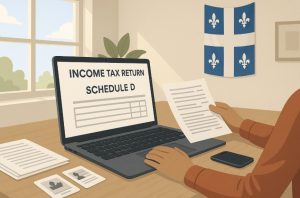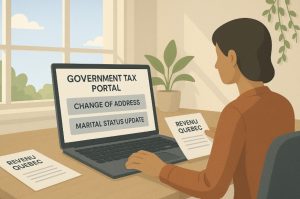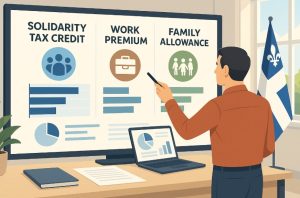Are you a resident of Québec wondering if you’re missing out on essential financial support? The Solidarity Tax Credit could be the help you need. Designed by the Government of Québec, this refundable credit supports low- and middle-income individuals and families by reducing the financial burden of provincial and municipal taxes.
Unlike standard tax credits, the solidarity credit offers various components tailored to your specific living situation and income level. If you meet certain eligibility requirements and file your income tax return correctly, this credit can become a regular source of relief. Payments are typically issued monthly, quarterly, or annually, depending on your total eligible amount.
Whether you’re new to the province, have experienced a change in household, or simply want to understand how this benefit works, this guide covers everything. Read on to discover how to qualify, apply, and make the most of your Solidarity Tax Credit in Canada.
What Is the Solidarity Tax Credit?

The Solidarity Tax Credit is a refundable tax credit issued by the Government of Québec to support low- and middle-income residents. It is structured to alleviate some of the provincial and municipal tax burdens, especially for individuals and families with modest earnings.
The amount you may receive is based on your personal situation as of December 31 of the previous year. For the period of July 2025 to June 2026, your eligibility and payment amount are based on your 2024 status.
The credit has three components, the QST (Québec Sales Tax) component, the housing component, and a component for residents in northern villages.
Even if you are only eligible for one or two of these, you may still qualify for the credit. All you need to do is file your income tax return and complete Schedule D to receive the full eligible amount. Direct deposit is required for payment processing.
Who Is Eligible for the Solidarity Tax Credit?
To qualify for the Solidarity Tax Credit for the period of July 2025 to June 2026, you must meet the following conditions as of December 31, 2024:
- You are a resident of Québec
- You are at least 18 years old, or you are younger than 18 and meet one of the following criteria such as having a spouse, being a parent living with your child, or being legally emancipated
- You are a Canadian citizen, a permanent resident, a protected person, or a temporary resident who has lived in Canada for at least 18 months
You are not eligible if any of the following apply:
- You were confined to a prison or similar institution for more than 183 days in 2024
- You were a refugee protection claimant as of December 31, 2024
- You or your spouse received Family Allowance payments for December 2024, unless you turned 18 that month
Even if you meet all these requirements, your family income must be below a set threshold to receive the credit. You can use Revenu Québec’s online estimator to check your eligibility.
How Can You Apply for the Solidarity Tax Credit?

To receive the Solidarity Tax Credit, you must file your annual income tax return and complete Schedule D. Without this, only a partial credit may be issued. Here’s how the application process works.
Applying Through Revenu Québec
You must submit your 2024 income tax return with Schedule D included. If you are new to Québec in 2024, ensure Schedule D is properly completed to receive the credit for July 2025 to June 2026.
Using Direct Deposit and Registering for Online Services
- Register for direct deposit to receive payments
- Keep your banking details up-to-date with Revenu Québec
- Note that failure to register or maintain banking information may cancel your credit by January 1, 2029
Filing Your Income Tax Return to Trigger Application Automatically
- Filing your return automatically initiates the credit application
- Couples must decide who completes Schedule D if living together
- If separated or living apart in long-term care, each files separately
It’s essential to file no later than December 31, 2029, to receive your payment for the 2025–2026 cycle. Proper completion ensures maximum benefit.
When Are Solidarity Tax Credit Payments Made?
Once your credit is approved, payment is determined by the total amount you’re eligible to receive. Here’s how payment schedules work.
Payment Schedule: Monthly, Quarterly
- If the credit is $800 or more, you’ll receive monthly payments
- For amounts between $241 and $799, payments are issued quarterly
- If the amount is $240 or less, a one-time payment is made in July
First-time Applicants and Typical Processing Time
- You may experience a delay if you don’t complete Schedule D
- Initial payments could begin in fall 2025 if you file late
- The first payment for 2025 is expected by July 4, 2025
How to Receive Payments via Direct Deposit
- You must be registered for direct deposit to receive any payment
- Your account will show the credit amount and date
- Monthly payments are typically made during the first five days of each month
Keep your My Account profile updated to view your payment history and notice of determination online. If you prefer paper communications, you can switch back at any time.
How Is the Solidarity Tax Credit Calculated?

Your credit for the July 2025 to June 2026 period is based on your personal and financial situation as of December 31, 2024. The credit calculation considers the sum of your eligibility across the three main components: the QST component, the housing component, and the component for individuals in northern villages.
Each of these components has distinct eligibility rules and benefit amounts. For example, if you reside in a low-rental dwelling, such as HLM, you may still be entitled to the QST component even if the housing portion doesn’t apply.
The total credit is reduced based on your family income. If your income exceeds a certain limit, the benefit may be reduced or eliminated. Also, in the case of debts owed to the government, up to 50% of your credit may be applied toward that debt depending on your income level.
Use the Revenu Québec estimator tool to calculate your estimated amount. It ensures you don’t miss out on potential benefits you deserve.
What Are the Different Components of the Credit?
The Solidarity Tax Credit is made up of three key components, each designed to address different cost burdens:
- The QST Component accounts for your provincial sales tax payments
- The Housing Component supports those paying rent or owning property
- The Northern Village Component aids residents of remote communities
You may still qualify even if not eligible for all three parts. For example, if you lived in low-rental housing (HLM) on December 31, 2024, you could still receive the QST portion and possibly the Northern Village portion if applicable.
Amounts for each component are added together to form the total benefit, which is then adjusted based on family income. It’s important to accurately complete Schedule D to ensure all eligible components are included.
If any information on your Schedule D is incorrect, submit a revised copy with Form TP-1.R-V to update your claim. Keeping everything accurate helps avoid delays or missed payments.
What Happens If Your Situation Changes?

Your Solidarity Tax Credit is determined based on your situation as of December 31, 2024, but certain changes can affect your eligibility or payment status. It’s important to update Revenu Québec when significant life changes occur.
Address, Marital Status, Income Changes
- Moving out of Québec
- Marriage, separation, or divorce
- Change in annual family income
- Spouse’s confinement to an institution
- Death of a spouse
How to Update Revenu Québec?
- Log in to My Account for individuals to report changes
- Submit a corrected Schedule D with supporting forms if needed
- Call Revenu Québec directly for major life events like death or incarceration
Impact on Future Payments
- You lose entitlement if no longer a Québec resident or incarcerated
- Surviving spouses may continue to receive payments if eligible
- Failure to report changes may lead to payment interruptions or overpayments
Although your entitlement is based on a fixed date, staying proactive with your updates ensures continued access to this important benefit. Make timely corrections to avoid delays or issues with future payments.
How Can You Check the Status of Your Solidarity Tax Credit?
After applying for the Solidarity Tax Credit, you might want to monitor your payments and updates from Revenu Québec. Here’s how to stay informed.
Using Revenu Québec’s Online Services
- Log into My Account for individuals
- View your latest payment, amount, and processing status
- Switch between digital and paper communications
- Consent is required to receive documents online only
Reading Your Notice of Determination
- Once processed, Revenu Québec sends a notice of determination
- This outlines how your credit was calculated
- It details your eligibility, components applied, and total amount
Contacting Revenu Québec for Clarification
- If you find discrepancies, you can contact Revenu Québec directly
- You may also request a correction using Form TP-1.R-V
- For delays, you’ll be advised on missing documents or eligibility issues
Monitoring your file through official channels ensures you’re always aware of payment status and eligibility updates. Keep your personal details accurate to receive notices promptly and avoid missed payments or confusion.
Solidarity Tax Credit vs Other Tax Credits in Quebec

Québec offers various tax credits, but the Solidarity Tax Credit stands out in a few key ways.
Comparison With Other Quebec Refundable Tax Credits
- Unlike specific credits (e.g., work premium), this one addresses living costs
- It includes unique elements like housing and geographic location
- Calculated from one fixed date rather than throughout the year
Who Benefits the Most From Solidarity Credit?
- Low- to middle-income individuals and families benefit most
- Especially helpful for renters, northern residents, and those on assistance
- Beneficiaries with consistent Québec residency and bank details see fewer delays
Common Misconceptions
- Some think you must reapply each year this isn’t necessary
- Believing that renters aren’t eligible is false
- Assuming it’s only for those with no income is incorrect
While other tax credits support specific activities like working or education, the Solidarity Tax Credit provides a baseline economic cushion. It’s essential to understand how it complements other credits you might qualify for to maximize your financial aid.
Quick Facts About the Solidarity Tax Credit
Here’s a helpful summary of everything you need to know about the Solidarity Tax Credit.
Eligibility, Payment Schedule, Amounts, and How to Apply?
| Category | Details |
| Eligibility Date | Based on situation as of December 31, 2024 |
| Age Requirement | 18 or older, or under with spouse/child/emancipated |
| Residency | Must reside in Québec and meet citizenship/residency conditions |
| Application Method | File 2024 tax return with Schedule D |
| Direct Deposit | Required for payments; register through Revenu Québec |
| Payment Frequency | $800+: Monthly, $241–$799: Quarterly, $240 or less: Annual |
| Components | QST, Housing, Northern Village |
| Estimation Tool | Available on Revenu Québec’s website |
| Adjustment for Changes | File updated Schedule D and TP-1.R-V |
| Ineligibility | High income, incarcerated, family allowance paid, refugee claimant |
Use this chart as a quick reference to ensure you meet the necessary criteria and don’t miss out on any payment due to technical or personal oversight.
Conclusion
Understanding the Solidarity Tax Credit can make a meaningful difference in your yearly finances, especially if you’re managing a tight budget. With various components that address living and regional costs, it stands out among provincial tax benefits in Québec.
Filing your income tax return with a completed Schedule D and keeping your personal information current are key steps to securing your full entitlement. The credit adjusts based on life events and family income, so staying informed about eligibility and updates is crucial.
Whether you’re new to Québec or long-settled, the Solidarity Tax Credit ensures support is there when needed. By taking advantage of the estimator tool and checking your status online, you can plan more confidently around your budget. For many residents, this credit is more than a tax return line, it’s financial peace of mind throughout the year.
FAQs
How do I know if I qualify for the Solidarity Tax Credit?
You qualify if you meet all eligibility requirements as of December 31, 2024, and file your tax return with Schedule D. You must also be a resident of Québec.
What income is considered for the solidarity tax credit?
The credit considers your total family income from the previous year. This includes all taxable and declared sources.
Do I have to apply every year for the solidarity tax credit?
No, as long as you file your annual tax return and meet the criteria, the credit is assessed automatically. Completing Schedule D ensures the full amount is calculated.
What if I move to a new address during the year?
If you move, you must notify Revenu Québec immediately. Not updating your address may delay or stop your payments.
Can I receive solidarity tax credit payments if I don’t have direct deposit?
No, you must be registered for direct deposit to receive payments. Without it, the credit cannot be processed or issued.
Why did my solidarity tax credit payment decrease this year?
This may be due to increased family income or incorrect information on your return. Using the estimator tool helps you track this.
Is the solidarity tax credit taxable income?
No, the credit is not considered taxable income. It does not affect your income taxes or social benefits.




